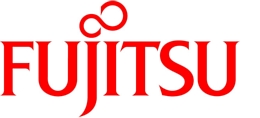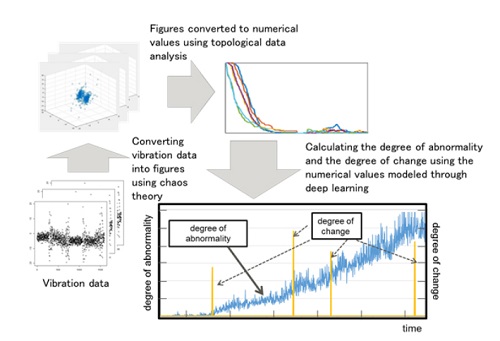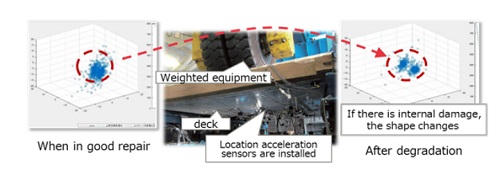|
| Monday, 28 August 2017, 10:19 HKT/SGT | |
| |  | |
Source: Fujitsu Ltd | |
|
|
|
|
| Enables estimation of failure, state of degradation with surface-mounted sensors |
TOKYO, Aug 28, 2017 - (JCN Newswire) - Fujitsu Limited and Fujitsu Laboratories Ltd. today announced the development of sensor data analysis technology that can aggregate vibration data with sensors attached to the surface of a bridge, and then estimate the degree of the bridge's internal damage through the application of "FUJITSU Human Centric AI Zinrai technology," Fujitsu's approach to artificial intelligence.
 | | Figure 1: Analysis of vibration data with this technology |
 | | Figure 2: Results of the verification test |
This technology was validated using data obtained from verification tests of fatigue degradation of bridges(1) carried out by the Research Association for Infrastructure Monitoring System (RAIMS)(2), a mutual aid organization that carries out joint research into technologies used in industrial activities.
In this way the technology enables enhanced maintenance and management tasks, making it possible to remotely estimate the degree of internal damage to bridge infrastructure.
Details of this technology will be announced at the Japan Society of Civil Engineers 2017 Annual Meeting, to be held at Kyushu University on September 11-13, 2017.
Development Background
As many bridges built in Japan's period of high economic growth continue to deteriorate, the work required to maintain and manage this type of infrastructure has increased rapidly, accompanied by social problems including rising maintenance costs and a shortage of engineers.
It is anticipated that these issues may now be resolved through the application of ICT to maintenance and management tasks for bridges and other social infrastructure.
Issues
Inspection tasks for bridges are usually performed visually to check the structure for damage. The issue with relying only on information gathered visually, however, is that inspectors can only identify abnormalities or anomalies appearing on the structure's surface, and are consequently unable to grasp information regarding the degree of internal damage.
In recent years, in order to advance the use of ICT in these inspections, there have been many trials in which sensors were attached to the surface of the bridge deck(3), using vibration data to evaluate the level of damage. With the methods used until now, accurately understanding the degree of damage within the interior of the deck was an issue.
About the Newly Developed Technology
Now, by expanding Fujitsu Laboratories' proprietary deep learning AI technology for time-series data(4), Fujitsu and Fujitsu Laboratories have developed technology that can discover anomalies and express in numerical terms degrees of change that demonstrate drastic changes in the status of objects such as structures or machinery, and detect the occurrence of abnormalities or distinctive changes. The technology learns from the geometric characteristics extracted from complex, constantly changing time-series vibration data collected by sensors equipped on IoT devices (Figure 1), thus enabling users to estimate and validate the state of degradation or failure in a variety of social infrastructure or machinery.
This technology has now been confirmed through the application of verification test data from RAIMS.
http://www.acnnewswire.com/topimg/Low_FujitsuSensor82817Fig1.jpg
Figure 1: Analysis of vibration data with this technology
Results of the Verification Test
This newly developed technology was applied to vibration data collected from acceleration tests (wheel load running test) performed by RAIMS. The results showed that the geometric characteristics extracted from the vibration data by this technology would appear as a single cluster when the bridge was intact, but the shape changes when the bridge had developed internal damage (Figure 2). Moreover, it was confirmed that the degree of abnormality and the degree of change that can be calculated by converting the geometric characteristics to numerical values correspond with the results measured by strain sensors embedded within the bridge deck, validating the effectiveness of the technology.
http://www.acnnewswire.com/topimg/Low_FujitsuSensor82817Fig2.jpg
Figure 2: Results of the verification test
Effects
From the analysis results of data from an acceleration sensor at a single location on the surface of a bridge, Fujitsu confirmed that it is possible to estimate the degree of damage(5) across a wide area of a bridge's interior using this technology. Additionally, detecting the occurrence of internal stress using this technology allows for the estimation of damage in its earliest stages, and can contribute to early countermeasures. Duplicating these tests in the future will make it possible to remotely estimate the degree of internal damage with a high degree of accuracy using surface-mounted sensors, enabling the enhancement of bridge maintenance and management tasks.
Future Plans
Fujitsu will conduct trials using vibration data from actual bridges, with the goal of real-world usage by around 2018.
(1) Verification tests of fatigue degradation of bridges
This verification test was carried out by RAIMS, as part of a commissioned research project on the research and development of technology promoting the use of monitoring technology for societal infrastructure, commissioned by the Ministry of Land, Infrastructure, Transport and Tourism as part of the Cabinet Office's Cross-ministerial Strategic Innovation Promotion Program (SIP), promoting technology to manage, update, and maintain infrastructure. Summary of the verification tests conducted by RAIMS Goal: Evaluate technology for monitoring the fatigue degradation of bridges Testing period: July-August 2015 Testing summary: Acceleration test to recreate the process of fatigue degradation of bridge decks in simulation, using an actual-size bridge deck and heavy load equipment (weighted wheeled testing apparatus). For the test, strain sensors were embedded within the actual-size bridge deck. In addition, the vibration data that was used for analysis was collected via acceleration sensors attached to the surface of the bridge deck. Location: Yamaguchi University
(2) Research Association for Infrastructure Monitoring System (RAIMS)
An organization consisting of 14 companies and legal entities, with the goal of promoting the rapid commercialization of monitoring technology. Fujitsu also carries out research and development as a member of the association.
(3) Bridge deck
The floor or surface of the bridge, which transfers the weight of vehicles travelling over the bridge to the columns or girders supporting the bridge.
(4) Deep learning technology for time-series data
Proprietary technology from Fujitsu Laboratories that accurately analyzes time-series data using a data analysis method called topological data analysis. "Fujitsu Develops New Deep Learning Technology to Analyze Time-Series Data with High Precision".
(5) Estimation of the degree of damage
During the acceleration tests, the degree of damage to the experimental bridge deck was judged visually by engineers in accordance with the Japanese Ministry of Land, Infrastructure, Transport and Tourism's guidelines for the periodic inspection of bridges, and estimated according to these results, as well as the results of an AI-based analysis.
About Fujitsu Laboratories
Founded in 1968 as a wholly owned subsidiary of Fujitsu Limited, Fujitsu Laboratories Ltd. is one of the premier research centers in the world. With a global network of laboratories in Japan, China, the United States and Europe, the organization conducts a wide range of basic and applied research in the areas of Next-generation Services, Computer Servers, Networks, Electronic Devices and Advanced Materials. For more information, please see: http://www.fujitsu.com/jp/group/labs/en/.
Contact:
Fujitsu Limited
Public and Investor Relations
Tel: +81-3-6252-2176
URL: www.fujitsu.com/global/news/contacts/
Topic: Press release summary
Source: Fujitsu Ltd
Sectors: Electronics, Cloud & Enterprise
http://www.acnnewswire.com
From the Asia Corporate News Network
Copyright © 2024 ACN Newswire. All rights reserved. A division of Asia Corporate News Network.
|
|
|

|
|
|
|
| Fujitsu Ltd |
| May 8, 2024 07:52 HKT/SGT |
|
ServiceNow and Fujitsu announce strategic commitment to launch innovative cross-industry solutions |
| May 7, 2024 16:53 HKT/SGT |
|
Fujitsu launches mainframe modernization automation service for the Japanese market |
| Apr 23, 2024 09:25 HKT/SGT |
|
Fujitsu SX Survey reveals key success factors for sustainability |
| Apr 22, 2024 15:09 HKT/SGT |
|
Fujitsu and METRON collaborate to drive ESG success: slashing energy costs, boosting productivity with new manufacturing industry solutions |
| Apr 19, 2024 09:17 HKT/SGT |
|
Fujitsu develops technology to convert corporate digital identity credentials, enabling participation of non-European companies in European data spaces |
| Apr 18, 2024 10:14 HKT/SGT |
|
Fujitsu and Oracle collaborate to deliver sovereign cloud and AI capabilities in Japan |
| Apr 11, 2024 14:10 HKT/SGT |
|
DOCOMO, NTT, NEC and Fujitsu Develop Top-level Sub-terahertz 6G Device Capable of Ultra-high-speed 100 Gbps Transmission |
| Apr 9, 2024 09:39 HKT/SGT |
|
Fujitsu AI transforms manufacturing lines with new quality control system for REHAU |
| Apr 1, 2024 15:17 HKT/SGT |
|
Fujitsu signs MoU with Mitsubishi UFJ Financial Group, Inc. to drive nature positive actions |
| Mar 29, 2024 09:28 HKT/SGT |
|
Fujitsu Selected as CDP Supplier Engagement Leader |
| More news >> |
 |
|
 |
|